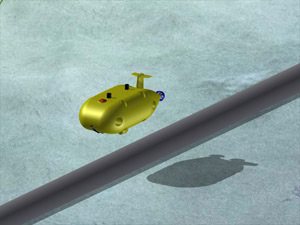Joint research for development of the algorithms of Autonomous Underwater Vehicle
Nov. 30, 2015

Tokyo, November 30, 2015 – Kawasaki Heavy Industries, Ltd. announced today that it has signed an agreement for a joint research program with Heriot-Watt University, UK for development of the algorithms for Autonomous Underwater Vehicles (AUV) which will be utilized in the offshore oil & gas field.
The project title is The Development of Multi-Sensor Fusion Algorithms for Underwater Pipeline Estimation by AUV at Close Range and the project itself has already started from September, 2015, and continues for four years.
Kawasaki has been developing state-of-the-art underwater technologies, and employing specialist know-how, it is now developing leading key technologies for AUV operation. The offshore oil & gas industry is targeted as the initial market, and in particular the demand for maintenance work on subsea pipelines laid on the seabed.
Through this joint research program, Kawasaki and Heriot-Watt University will develop, test and verify algorithms for position specification of target objects so that an AUV can autonomously locate and track pipelines underwater. Specifically, an AUV equipped with these algorithms is expected to track along a subsea pipeline at close range, including buried and invisible sections, using data from multiple sensors.
Kawasaki’s partner, the Ocean Systems Laboratory(*), Heriot-Watt University, is well known as a leading organization for research and development of new technologies in the offshore field, and has expertise in control and autonomy of underwater vehicles for both offshore oil & gas and renewable-energy applications.
The know-how of Heriot-Watt University to develop tracking algorithms will be backed-up with the abundant experience in on-site offshore work-fields and the technologies of Kawasaki to manufacture the vehicles, and also program the controlling method for auto docking. By the collaboration of these technologies, Kawasaki will make progress in the research and development of a leading-edge AUV.
The term of this joint research program will continue until August, 2019.
Thereafter, Kawasaki will build a demonstration model of an AUV which incorporates the above algorithms to carry out final verification tests in a real subsea area such as the North Sea in the year 2020, with the intention of launching a production model to the market in due course.
- (*)
- Ocean Systems Laboratory
The Ocean Systems Laboratory is a key laboratory within the Edinburgh Centre for Robotics which is a £35M joint venture between Heriot-Watt University and the University of Edinburgh, supported by EPSRC (The Engineering and Physical Silences Research Council), Industry and the Universities. It is a multidisciplinary science and engineering research laboratory that innovates, applies and teaches world class advances in autonomous systems, sensor modelling/processing, and underwater acoustic system theory/design for offshore, marine science, renewable energy and security applications.
Contact
If you need more information about our business,
please feel free to contact us.





